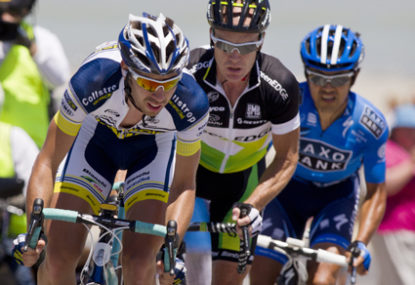'I've just won a stage of the Tour de France, mate!': Hindley grabs yellow jersey as Aussie blows Tour apart
Australia's Jai Hindley has said he is "lost for words" after a shock stage victory at the Tour de France earned him the leader's…

Pro road racing is the people’s sport. It uses public roads and visits our cities, towns and villages. No one has to pay to see the great races. For plenty of people the races even come to them. There are no stadia, no turnstiles.
Training gets done on the open road too. You can even join in and ride with a pro if you like. There’s nothing to stop you.
Road cycling is the most accessible pro sport on the planet. The public interface is so close that people identify with racers, especially in Europe where different places traditionally adopt their local pro and form supporters clubs.
But is this link in danger of being broken? Last week I spoke to a former champion who thinks it might.
Stephen Roche is cycling royalty. Twenty-five years ago he achieved something that seems impossible today. He won the Giro d’Italia, Tour de France and world road race title in a single year.
That’s three of cycling’s four jerseys; the pink, yellow and rainbow. Only Eddy Merckx did that before Roche, and nobody has done it since.
Roche was a brilliant racer, but the Irishman was also the most media friendly athlete I have ever seen. Win or lose he would smile, ruefully perhaps, and explain in detail what happened and why. Now, though, he shakes his head in disbelief at the way some racers conduct themselves, both in races and with the media, although he points out that it’s not always their fault.
“I think that the team’s PR people have become too important. Some of them try to get between the riders and the media, but at the same time they don’t get the riders to work as hard with the media as they should,” he says.
He reckons it could have consequences for the sport; “Ok, it’s an extreme example and we hope it never happens, but if there was another scandal like the ’98 Tour I don’t think cycling would survive it now.
“It only survived then because people knew the riders; they knew them, knew their lives and identified with them. They were able to say; ‘ok, this guy has two kids, he tries hard, he’s made a mistake but people make mistakes.’ I don’t think that would happen now.”
Roche thinks that many of today’s racers are losing this vital connection with the public, while not realising it because they aren’t switched on to where their support comes from.
Things like neutralising a race when poor weather conditions cause crashes, like Fabian Cancellara did on a stage of the 2010 Tour de France Tour stage, doesn’t help either.
“Ok, it was dangerous, but it would have been better to let things come back together after the crashes then continue racing. Neutralising the whole stage robbed us of an exciting Tour, with riders forced to attack to make up the time they lost in the difficult conditions. It also deprived the local towns of their Tour de France spectacle, something they’d paid money for. And what about the people standing by the side of the road, or watching the TV?” Roche asks.
But this isn’t a case of an ex-champion saying things aren’t as good as they used to be. Roche reckons that today’s racers are just as capable of producing excitement as those of the past.
“Look at Andy Schleck’s big attack in last year’s Tour. The shorter stages now mean no one dares make a move until the last climb, but when Schleck had to attack early he did attack early, and what a spectacle it was. He also made the next stage great because Contador had to try from early on to stand any chance of winning,” he points out.
Today’s champions are every bit as good as the champions before them, but Roche reckons they need to work on their relationship with the public.
“It’s the public who buy into any sport and they are the one who need to be impressed. I think that some of today’s riders haven’t learned that yet,” he says.
The solution is for racers and their PR people to connect with the public again. “Riders must take time to explain themselves, win or lose, and do it with good humour. They also need to establish their characters with the public, so they get to know them and know about them.” Roche advises.